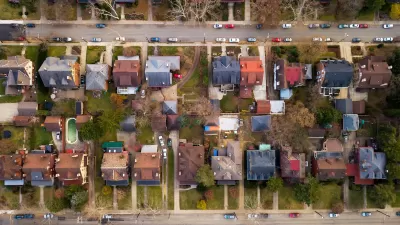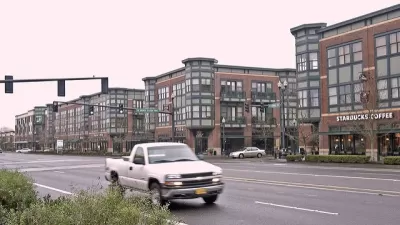The island nation is mandating mid-density zoning requirements and transit-oriented development in an effort to increase housing affordability and encourage compact development.

Responding to the rise in housing costs that has affected even remote corners of the world, New Zealand recently passed "sweeping zoning reform legislation" that encourages mid-density housing development. As Ryan Greenaway-McGrevy writes, these reforms provide some valuable lessons for other countries.
For decades, New Zealand's housing policy essentially omitted middle-density, multi-unit housing types like rowhouses or mid-rise apartment buildings, favoring single-family homes and high-rise apartment buildings in limited urban areas. But now, with significant population growth raising demand for the country's limited housing, lawmakers from across the political spectrum are seeking ways to slow the growth of housing costs. In addition to the new Medium Density Residential Standard, policies include "a capital gains tax targeted at housing speculation, a ban on foreign investment in residential housing, fast-tracked inclusive housing developments, and state-subsidized housing development projects." In 2020, as part of its National Policy Statement on Urban Development, the government mandated higher-density development near transit lines.
Kiwis saw success with upzoning policies in Auckland, where the city's Auckland Unitary Plan (AUP) led to a sharp increase in permits for attached housing and more development in the city's inner suburbs. But although New Zealand's policy experiments show promising results in stimulating construction, it remains to be seen whether increased affordability will follow suit, and how long it will take for supply to meet demand.
FULL STORY: New Zealand’s bipartisan housing reforms offer a model to other countries

Maui's Vacation Rental Debate Turns Ugly
Verbal attacks, misinformation campaigns and fistfights plague a high-stakes debate to convert thousands of vacation rentals into long-term housing.

Planetizen Federal Action Tracker
A weekly monitor of how Trump’s orders and actions are impacting planners and planning in America.

In Urban Planning, AI Prompting Could be the New Design Thinking
Creativity has long been key to great urban design. What if we see AI as our new creative partner?

King County Supportive Housing Program Offers Hope for Unhoused Residents
The county is taking a ‘Housing First’ approach that prioritizes getting people into housing, then offering wraparound supportive services.

Researchers Use AI to Get Clearer Picture of US Housing
Analysts are using artificial intelligence to supercharge their research by allowing them to comb through data faster. Though these AI tools can be error prone, they save time and housing researchers are optimistic about the future.

Making Shared Micromobility More Inclusive
Cities and shared mobility system operators can do more to include people with disabilities in planning and operations, per a new report.
Urban Design for Planners 1: Software Tools
This six-course series explores essential urban design concepts using open source software and equips planners with the tools they need to participate fully in the urban design process.
Planning for Universal Design
Learn the tools for implementing Universal Design in planning regulations.
planning NEXT
Appalachian Highlands Housing Partners
Mpact (founded as Rail~Volution)
City of Camden Redevelopment Agency
City of Astoria
City of Portland
City of Laramie





























